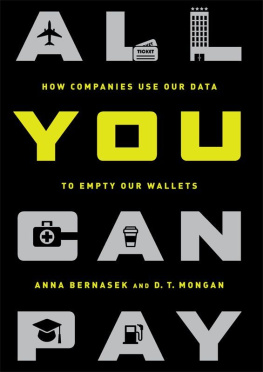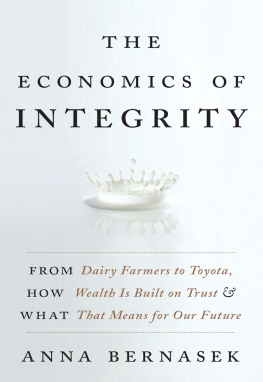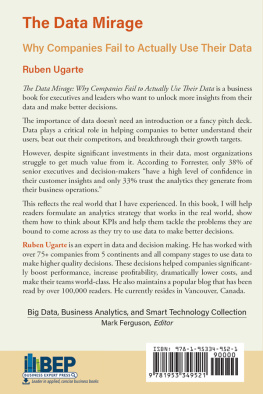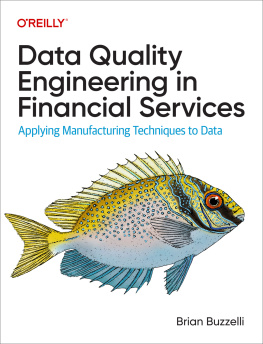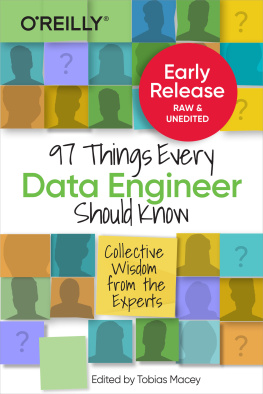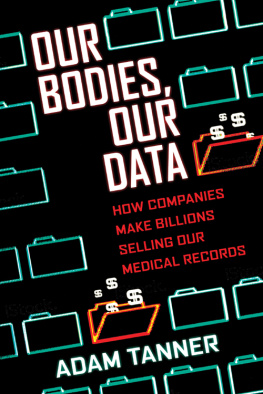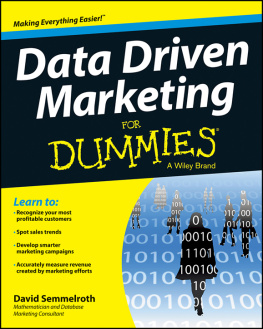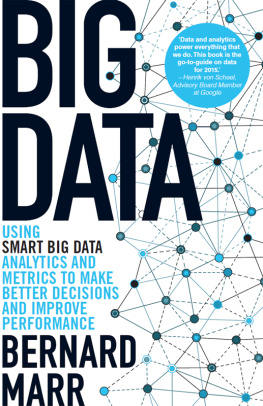All You Can Pay
Also by Anna Bernasek
The Economics of Integrity : From Dairy Farmers to Toyota, How Wealth Is Built on Trust and What that Means for Our Future (2010)

All You Can Pay
How Companies Use Our Data to Empty Our Wallets
ANNA BERNASEK
and
D. T. MONGAN

Copyright 2015 by Anna Bernasek and D. T. Mongan.
Published by
Nation Books, A Member of the Perseus Books Group
116 East 16th Street, 8th Floor
New York, NY 10003
Nation Books is a co-publishing venture of the Nation Institute and the Perseus Books Group.
All rights reserved. Printed in the United States of America. No part of this book may be reproduced in any manner whatsoever without written permission except in the case of brief quotations embodied in critical articles and reviews. For information, address the Perseus Books Group, 250 West 57th Street, 15th Floor, New York, NY 10107.
Books published by Nation Books are available at special discounts for bulk purchases in the United States by corporations, institutions, and other organizations. For more information, please contact the Special Markets Department at the Perseus Books Group, 2300 Chestnut Street, Suite 200, Philadelphia, PA 19103, or call (800) 810-4145, ext. 5000, or e-mail special.markets@perseusbooks.com.
Designed by Milenda Lee
A CIP catalog record for this book is available from the Library of Congress.
ISBN: 978-1-56858-474-4 (HC)
ISBN: 978-1-56858-475-1 (EB)
Library of Congress Control Number: 2015934539
10 9 8 7 6 5 4 3 2 1
To Lily and Natalie
Contents
How the nearly limitless consumer surplus represents the ultimate economic prize
Dividing markets into ever-smaller segments shifts the balance of power
Why the information available to large sellers always outpaces what consumers know
Using intelligent systems to set different prices for each customer
Gaining advantage by product customization
Sellers power to write the rules puts customers at a disadvantage
The race among ten data giants to dominate the economy
What the power to instantly modify product, price, and terms means to the economy
Proposing a worldwide movement to understand data and negotiate its use
The steps to preserve a robust economy
T here was once a town in the heart of America where citizens lived in prosperity and harmony. In that town lived a young family, full of hope and promise, in a small but neatly kept home. In the mornings the children walked to the local elementary school, and the parents headed to work. They spent evenings together after doing homework and sharing a family meal.
The family wasnt rich, but it was prosperous. Work was secure, and together the parents made more than enough money to cover expenses and steadily add a bit to savings. As season followed season, the children blossomed, and the parents glowed with pride.
Material abundance surrounded them. Nearby shops stocked more than anyone could ask for, attractively displayed and carefully labeled at reasonable fixed prices. The supermarket alone stocked thirty thousand items for the household. Whatever wasnt available locally could conveniently be ordered from locations far and wide. Choices had to be made, of course, but a decent income and responsible spending habits covered the necessities, as well as treats like vacations and a few indulgences.
Year followed blissful year, until one day the parents noticed things had changed. Work became a little less secure, and expenses seemed harder to meet. The first shock came in the form of a surprise medical bill that insurance did not cover, followed by a very expensive car repair during an inopportune time when the family was hundreds of miles from home. Next, the mortgage payment rose sharply. At the supermarket, despite incessant promotions and discounts, the final bill always seemed to be higher than expected. Cellular phone and Internet bills occasionally jumped by hundreds of dollars. The price of energyelectricity and heating oilbegan to spike inexplicably. Banking and credit-card fees popped up where none had been before. The investment fund holding the familys savings suffered a loss. Worst of all, a drop in their homes value made it worth less than the amount due on the mortgage.
The formerly happy family felt a kind of blight creep into their lives. Where once they had felt security, they now felt festering anxiety. Vague financial concerns coalesced into a gnawing dread of impending need. Rather than saving and getting ahead, the family began to fall behind.
Soon the family couldnt keep within a budget anymore. The price of everything, from milk to mortgages, seemed to shift according to mysterious market forces. A decent portion of the family budget just couldnt be predicted at all. And there arose more and more nasty surprises, such as an item or service costing many times what, in the past, had been considered fair. Every time the parents found a new solution or managed to save a little money, things would change. Once an introductory period for a new product or contract passed, the price would jump before the family even got used to the new arrangement. It seemed nothing was offered on simple fixed terms anymore. There were complicated deals for just about anything. Some businesses charged a definite price but left uncertain what goods or services would actually be delivered. Other products required contracts with penalties and fees that kicked in all the time.
The parents began to have slightly paranoid concerns. They wondered if their smartphones, tablets, and computers were watching them. Aggressive online offers appeared to correspond to private e-mail messages. Search results took into account not just location but other preferences that could only come from intimate knowledge. The price of eggs spiked just before a Sunday brunch party, which seemed odd. And even gasoline seemed to cost more when the family was running late.
The worst of it was, the family felt as if it were on its own. There was no recourse when they made a bad bargain; the terms worked against them in whichever one of the hundreds of service contracts and user agreements the parents had apparently agreed to. They couldnt appeal to the unfairness of it all because they could no longer tell what was fair and didnt even fully understand the terms of what they were buying. It would have been absurd to even think of trying to figure out whether others were receiving similar deals or something different. The only thing they knew for sure was that their friends and neighbors felt anxious too. Meanwhile, a few well-positioned companies seemed to be doing very well indeed.
* * *
Our little fable is just that: a fable. But every part of it is, in a sense, true. Millions of consumers have experienced some of the effects described, and more than a few have experienced the majority of them. Businesses throughout the world are learning more and more about how to charge the highest price for their wares and services and how to shift risk off of their own books and onto the backs of customers.
We are not, at least not entirely, the passive victims of a sinister plot. In large part we have done this to ourselves. Like the Algonquins selling all of Manhattan for a few ax-heads and blankets, consumers seem eager to compromise their future in exchange for pennies worth of service or convenience.
Today we gaze upon the waning days of a great consumer age, standing at the threshold of a new era. Mass markets with low-cost commodity products are quickly disappearing. Huge, well-capitalized firms are amassing more information than ever before conceived. All of the individual building blocks to completely reshape the global consumer economy exist. The techniques are not yet perfected, but change is arriving at the speed of data.
Next page
